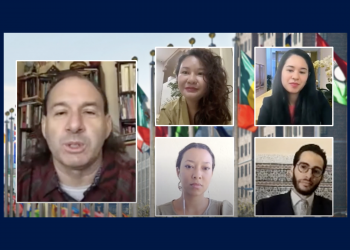The Spirit of Youth in Action
By Saphira Rameshfar
Among the notable occurrences of this past month stands the largest youth-focused event in the history of the United Nations. A sign of great potential still to come, the ECOSOC Youth Forum for the first time in its 10 year history opened its virtual doors to a broader cohort of youth from every clime. Drawing some 19,000 participants, fueled by a shared concern for the prosperity of our world and its peoples, deliberations unfolded to consider what critical steps need to be taken to provide for the present we all need and the future we all long for.
This occurrence was by no means a minor feat amidst the compounding effects of a global pandemic. The lives of many young people have been shaken by COVID-19, with the daily unfoldment of increasing uncertainties, from school closures to heightened unemployment, from profound loss to unmet aspirations. Yet, this period was also a time when the potential of young people came to the fore and the qualities they tend to exhibit showcased. From every corner, in every locality, what was common to large swathes of this age group was the boundless energy, stamina, and concern for the well-being of their communities. Young people arose to support those in need, and in many critical instances, young people were a wellspring of what was thought to be a resource in limited supply—hope. Amidst this time, youth have channeled their energies to devising creative responses, and have partnered with diverse actors and institutions to respond to the needs of the whole. To this spirit, a light should be cast.
The acute sense of justice exhibited by youth has also extended beyond the immediate effects of the pandemic to calls for equality, for integrity, for accountability, and for action in support of the stewardship of our precious earth. They have been offering new insight into some of the deeply embedded assumptions that have been so ingrained in our existing structures and institutions, and are providing a fresh perspective in humanity’s collective pursuit of a more just and prosperous future. We can see this spirit of ownership and resilience pronounced at this great time of difficulty. Youth are emerging as protagonists committed to the fulfillment of universally-held values and are laboring towards the realization of some of our long-cherished aspirations.
These are but initial glimmerings of the potential that exists within our communities. Here lies a reservoir holding a spirit that is yet to be fully tapped. Noteworthy is what has already been achieved within our current sphere of possibility. How much more profound will such a constructive force be when our entire communities and institutions consciously create conditions for an even greater degree of meaningful engagement of our youth? Not only is the community important as a protagonist to enable the unfoldment of this potential, but it can also serve as an arena where youth can begin to cultivate their capacities, assess the challenges that exist in their immediate surroundings, and respond constructively in search of solutions. For if youth are enabled to contribute within this microcosm of our world, a sphere which mirrors the profound challenges humanity at large is facing, their leadership and participation in informing a growing body of knowledge can be more fully expressed and drawn upon.
How can we as a community, then, create the necessary conditions conducive to the realization of the potential of youth, and what can be done to fully channel their talents and capabilities in service of our societies? Beyond increasing youth participation in decision-making mechanisms, how can a growing range of opportunities be afforded for young people to think about and contribute to the well-being of our shared immediate realities? And how can we ensure that a diversity of perspectives, of all age groups and backgrounds, is brought to bear through a truly intergenerational movement, where all are working in concert and learning from each other for the betterment of society?
These are some of the questions we can begin to ask ourselves on this 10th anniversary of the Youth ECOSOC Forum. Let us then collectively pave the way in fully recognizing and honoring the value and contributions of young people as critical components weaving the fabric of our shared reality.
Saphira Rameshfar is a Representative of the Bahá’í International Community to the United Nations
